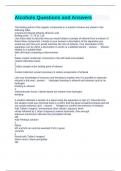-
1. Exam (elaborations) - Asid questions and answers
-
2. Exam (elaborations) - Asid 5-definition vocabulary questions and answers
-
3. Exam (elaborations) - Interior design professional organizations questions and answers
-
4. Exam (elaborations) - Id obj. 1.01- interior design organizations questions and answers
-
5. Exam (elaborations) - Common acids questions and answers
-
6. Exam (elaborations) - Acid and bases questions and answers
-
7. Exam (elaborations) - Interior design a- lesson 09 questions and answers
-
8. Exam (elaborations) - Chemical formulas (acids) questions and answers
-
9. Exam (elaborations) - Ncidq idfx professional development and ethics questions and answers
-
10. Exam (elaborations) - Professional development and ethics questions and answers
-
11. Exam (elaborations) - Professional practice questions and answers
-
12. Exam (elaborations) - Professional practice exam review (quizzes) questions and answers
-
13. Exam (elaborations) - Interior design - construction documents questions and answers
-
14. Exam (elaborations) - Cads 3500 questions and answers
-
15. Exam (elaborations) - Acetylsalicylic acid (aspirin) questions and answers
-
16. Exam (elaborations) - Gastric acid secretion questions and answers
-
17. Exam (elaborations) - Valproic acid questions and answers
-
18. Exam (elaborations) - Acetylsalicylic acid (aspirin) questions and answers
-
19. Exam (elaborations) - Valproic acid questions and answers
-
20. Exam (elaborations) - Fatty acids and other structures questions and answers
-
21. Exam (elaborations) - Nitric acid questions and answers
-
22. Exam (elaborations) - Valproic acid questions and answers
-
23. Exam (elaborations) - Biology nucleic acid structure questions and answers
-
24. Exam (elaborations) - Lactic acid questions and answers
-
25. Exam (elaborations) - Folic acid questions and answers
-
26. Exam (elaborations) - Properties of acids and bases questions and answers
-
27. Exam (elaborations) - Acid-fast stain questions and answers
-
28. Exam (elaborations) - Molecular - chapter 4 - nucleic acid extraction questions and answers
-
29. Exam (elaborations) - Acids (names & formulas) questions and answers
-
30. Exam (elaborations) - Carboxylic acids questions and answers
-
31. Exam (elaborations) - Niacin (nicotinic acid, vitamin b3) (pg 447) questions and answers
-
32. Exam (elaborations) - Conjugate acid-base questions and answers
-
33. Exam (elaborations) - Alpha hydroxy acid questions and answers
-
34. Exam (elaborations) - Folic acid questions and answers
-
35. Exam (elaborations) - Chapter 23 abscisic acid questions and answers
-
36. Exam (elaborations) - Tranexamic acid questions and answers
-
37. Exam (elaborations) - Niacin (nicotinic acid, vitamin b3) pharmacological class: water soluble vitamins ...
-
38. Exam (elaborations) - Uric acid measurement questions and answers
-
39. Exam (elaborations) - Miscellaneous antiepileptics (valproic acid) questions and answers
-
40. Exam (elaborations) - Amino acid - structure to one letter code questions and answers
-
41. Exam (elaborations) - Ob hesi concept 2021 (evolve eaq) questions and answers
-
42. Exam (elaborations) - 8.5 strong and weak acids and bases questions and answers
-
43. Exam (elaborations) - Recrystallisation of benzoic acid questions and answers
-
44. Exam (elaborations) - Ap chem quiz 4.1.2 questions and answers
-
45. Exam (elaborations) - Alcohols questions and answers
-
46. Exam (elaborations) - Acid, base, or both? questions and answers
-
47. Exam (elaborations) - Ch. 17: fatty acid catabolism questions and answers
-
48. Exam (elaborations) - Deoxyribonucleic acid (dna) questions and answers
-
49. Exam (elaborations) - Biology // proteins and nucleic acids questions and answers
-
50. Exam (elaborations) - Nclex gi studies uric acid questions and answers
-
51. Exam (elaborations) - Acid formulas questions and answers
-
52. Exam (elaborations) - 4.2 - strong acids & weak acids questions and answers
-
53. Exam (elaborations) - Acid/base balance content post test- hurst questions and answers
-
54. Exam (elaborations) - Valproic acid questions and answers
-
55. Exam (elaborations) - Vitamin b5 (pantothenic acid) questions and answers
-
56. Exam (elaborations) - Biochemistry chapter 28 fatty acid synthesis questions and answers
-
57. Exam (elaborations) - 14 - carboxylic acids, esters, amines, and amides questions and answers
-
58. Exam (elaborations) - Lactic acid and lactate questions and answers
-
59. Exam (elaborations) - Bile acid sequestrants questions and answers
-
60. Exam (elaborations) - Amino acid side chains questions and answers
-
61. Exam (elaborations) - Week 12 - carboxylic acids and esters practice questions and answers
-
62. Exam (elaborations) - Determination of concentration of hcl acid questions and answers
-
63. Exam (elaborations) - Acid-base equilibria questions and answers
-
64. Exam (elaborations) - Acid-base titration curves questions and answers
-
Show more




